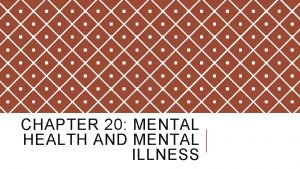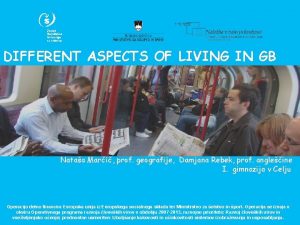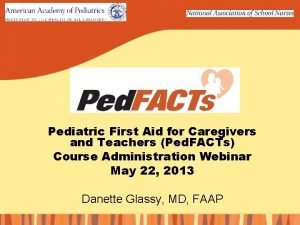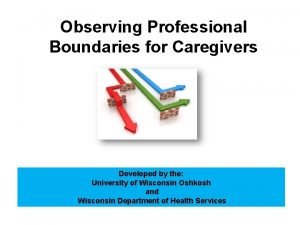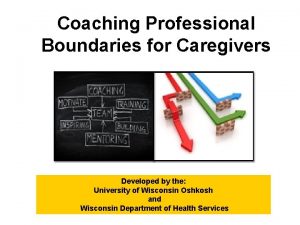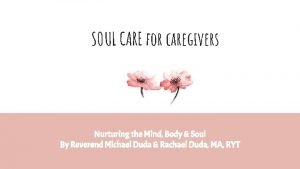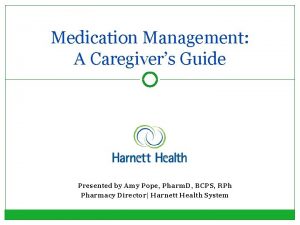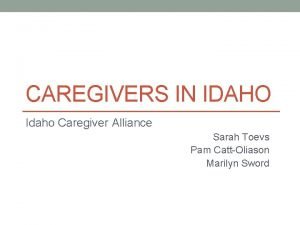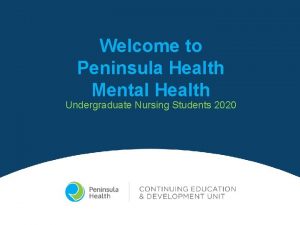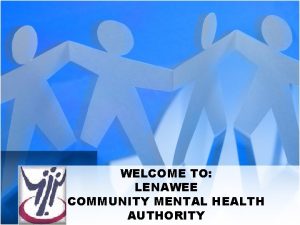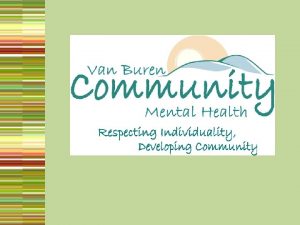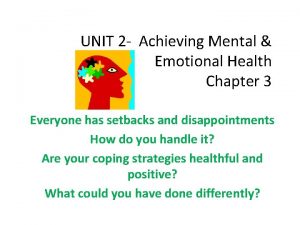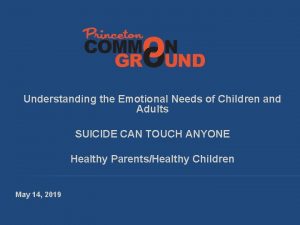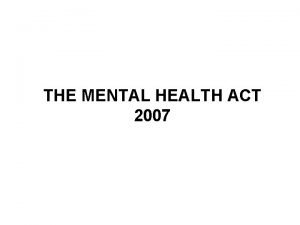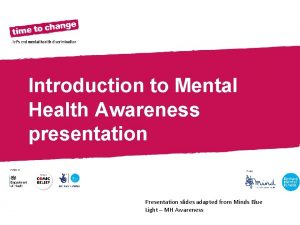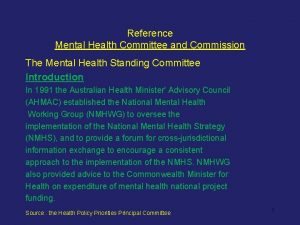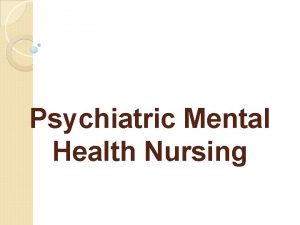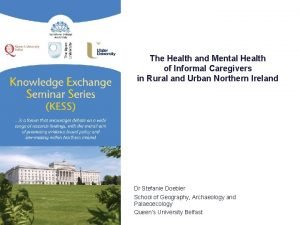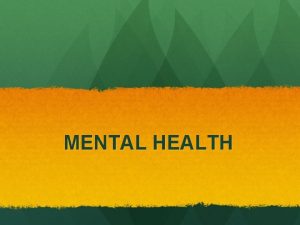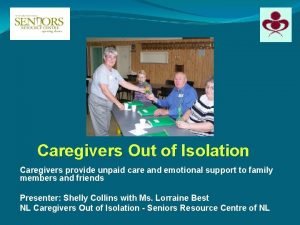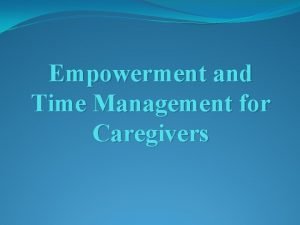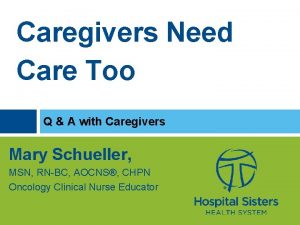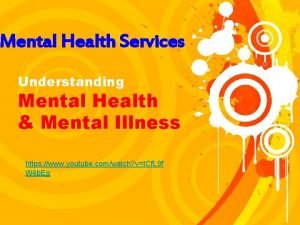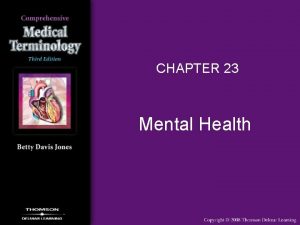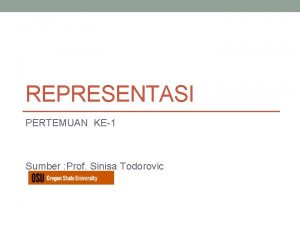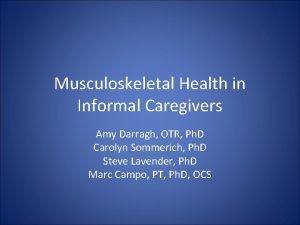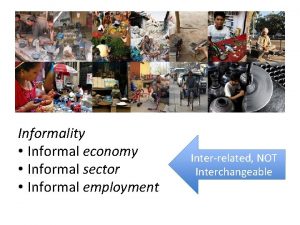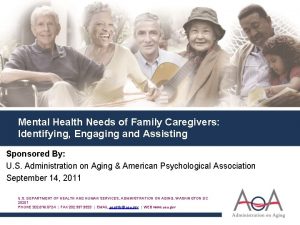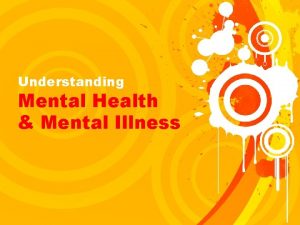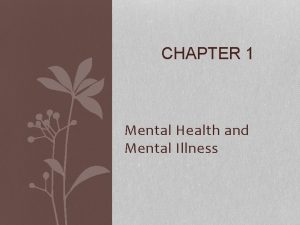Mental health of informal caregivers NATASA TODOROVIC PROF































- Slides: 31

Mental health of informal caregivers NATASA TODOROVIC PROF. DR NATAŠA MILIĆ PROF. DR DEJANA STANISAVLJEVIĆ DR MILUTIN VRAČEVIĆ

Definition „Informal caregiver is a person providing continuous care and support, without remuneration, for family members and friends who need support due to physical, cognitive or mental issues“. Informal care includes support in four main areas: • Activities of daily life (e. g. : bathing, support with toilet routine and eating); • Instrumental activities of daily life (e. g. : house chores, transport and managing finances, procurement); • Socialisation and emotional support; • Health related care

A profile of informal caregiver • One third of population over 50 provides some form of informal care services • Women outnumber men in this population • A little over half of all informal caregivers provides services less than ten hours per week and a little under one fifth provides services for more than 20 hours per week. • Increased risk of unemployment compared to their peers who do not provide informal care

Informal carers during COVID-19 crisis • Early in the pandemic many states failed to recognise importance of the role of informal caregivers for functionally dependent older persons, children and adults with chronic conditions or disability and persons with COVID-19 staying at home • During the epidemic a new subgroup of informal caregivers came into being who provided support to older persons not functionally dependent or ill but prohibited from leaving their homes • Care at home during COVID-19 was one of the pillars of health support to persons with COVID 19/ persons with possible infection, but informal caregiving and its challenges went unrecognised by the healthcare system during the epidemic • Carers UK provides some data for the United Kingdom: 81% informal caregivers provides more care services than before the lockdown and 78% reports the needs of the person they care for have significantly increased; 64% had no time to take a break over the last six months and 64% report worsened mental health (alongside 58% reporting worsened physical health status).

Mental health of informal caregivers • Providing informal care may have diametrically opposed effects to mental health of informal caregivers • This activity may bring satisfaction and the sense of accomplishment • But on the average, informal caregivers have worse physical and mental health compared to their peers not providing care services; they are also at a higher risk of depression • Worse physical health of informal caregivers is related to heightened depression risk and this further affects the quality of care services • In cases where the caregivers perceives the person receivng car eas commandeering and manipulative, the risk of depression increases, as it does when the caregiver feels they can not do their routine activities • Social exclusion affects the quality of life of caregivers significantly and the literature recognises it but it is as yet underresearched • Informal caregivers who are unemployed, have no life partner and no social support are in the higher risk group

10 Common Symptoms of Caregiver Stress 1. Depression 8. Anxiety 2. Withdrawal 9. Drinking or smoking 3. Insomnia 10. Altered eating habits 4. Trouble concentrating 5. Anger 6. Health issues 7. Exhaustion

Research goal The main goal is to measure the influence and the effects of informal care (especially during the COVID-19 epidemic) on mental health of informal caregivers and, based on the results, provide recommendations for planning and development of public policy in order to improve the quality of life and promote improved mental health for informal caregivers, as well as to develop support services

Quantitative research • The sample was formed using stratified sample with regions being: Belgrade, Vojvodina, Sumadija and Western Serbia, and Eastern and Southern Serbia • 798 participants, 41 municipalities • Questionnaire is made of nine sections: (1) sociodemographic characteristics of informal caregivers; (2) general information about the person receiving care; (3) functional status of the person receiving care; (4) caregiver burden; (5) depression; (6) fatigue; (7) health and functional ability; (8) social support and (9) COVID-19. • For assessing burden Zarit Burden Interview, ZBI was used. For assessing functional status of persons receiving care, validated scales were used, for assessing their independence in Activities of Daily Living, ADL, The Lawton Instrumental Activities of Daily Living (IADL) Scale was used. To assess fatigue of informal caregivers Fatigue Severity Scale, FSS was used and to assess depression we used Beck's Depression Inventory, BDI

Qualitative research • 4 focus groups in three municipalities: Novi Sad, Pirot and Belgrade • 32 participants (29 demale, three male)

Research results

Gender, age and marital statis of informal caregivers Gender Age Marital status 6% 29% 4% 21% 12% Married Not married 12% 59% 71% 13% 73% Male Female 18 -34 35 -64 65+ Divorced Widowed Civil union

Caregiver characteristics Education level 60 Employment status 50 55, 8 45 50 40 40 35 30 28, 5 30 24, 1 25 20 19, 3 20 11, 7 15 10 2, 3 1, 8 0 47, 1 None or Primary school incomplete primary school Secondary school College/ university Master or Doctoral Degree 7, 5 10 5 0 1, 9 Employed Unemployed Retired Housweife Other

Characteristics of persons receiving care Age of the person receiving care Gender of the person receiving care 36, 3 40% 22, 7 20, 8 60% 7, 9 2, 4 <18 3, 4 3, 1 2, 6 18 -34 35 -44 45 -54 55 -64 65 -74 75 -84 >=85 Male Female

Distribution of years of providing care (in years) 44, 8 24, 3 19, 3 11, 6 ≤ 1 2 -5 6 -9 ≥ 10

Distribution of informal carers by sharing the household with the person receiving care 33% 67% Shared household Not shared

Frequency of care provision Mobthly, weekly Daily, in hours 46, 3 78, 5 38, 0 15, 7 15, 5 4, 2 Every day Several days per week At least once per week 1, 9 At least once per month <6 6 -12 >12

Relationship between the caregiver and the person receiving care 50 9% 45, 8 45 40 35 32, 2 30 25 20 13, 4 15 8, 6 10 91% 5 0 Relatives Not relatives Father/ Mother Spouse Daughter/ Son Some other blood relation

Support with providing care 32% 68% Yes No

Financial implications of care provision Financial means to meet the needs of the person receiving care Financial support in meeting the needs of the person receiving care 18% 14% 31% 52% 30% 55% Sufficient Not sufficient Don't know Yes, regularly Yes, occassionally No

Degree of difficulty in providing care to the person receiving care 35 30, 7 30 26, 9 25, 2 25 20 15 10, 8 10 6, 5 5 0 0 -2 3 -4 5 -6 7 -8 9 -10

Basic activities of daily life (ADL) Degree of dependence of persons receiving care in performing basic ADL Eating 32, 7 0 32, 2 Continence Basic ADL score of persons receiving care 13, 6 1 40, 0 8, 2 2 Moving around the house 43, 5 6, 2 3 Using toliet 42, 1 Putting clothes on 48, 2 20, 0 30, 0 40, 0 50, 0 60, 0 26, 6 6 61, 5 10, 0 7, 2 5 Bathing 0, 0 5, 7 4 70, 0 5, 0 10, 0 15, 0 20, 0 25, 0 30, 0 35, 0

Instrumental activities of daily life (IADL) Degree of dependence of persons receiving care in performing IADL Managing finances 89, 5 Using medication Basic IADL score of persons receiving care 2, 5 0 1, 5 1 55, 5 Maintaining clothes 88, 9 Cleaning and housekeeping 89, 9 2, 3 2 6, 0 3 6, 4 4 Preparing meals 81, 5 Purchasing foodstuffs 84, 8 Using transport, bus or taxi 84, 8 Using telephone 36, 0 0, 0 10, 0 20, 0 30, 0 40, 0 50, 0 60, 0 70, 0 80, 0 90, 0 100, 0 9, 8 5 19, 9 6 20, 4 7 31, 1 8 0, 0 5, 0 10, 0 15, 0 20, 0 25, 0 30, 0 35, 0

Support in providing care services Existence of support Support provided by a close person, civil society organisations and public institutions Civil society 7, 9 28, 2% Public institutions 7, 9 71, 8% Close persons No Yes 63, 1 0 20 40 60 80

Informal caregivers during COVID-19 pandemic Distribution of needs of informal caregivers during the pandemic Fear of informal caregivers for their own and other person’s health during the pandemic 29, 3 Information 18, 5 Support services Do you fear more for your own health or health of the person you provide care to? 21, 9 Respite services 67, 30 32, 0 Protective equipment Is health of the person you provide care to at a higher risk now than before the epidemic? 14, 8 Hygiene items 6, 6 Meals 68, 70 5, 3 Psychological support 10, 4 Psychosocial support Is your health at a higher risk now than before the epidemic? 2, 8 Online education 61, 50 13, 5 Other 0, 0 5, 0 10, 0 15, 0 20, 0 25, 0 30, 0 35, 0 10, 0 20, 0 30, 0 40, 0 50, 0 60, 0 70, 0 80, 0 90, 0 100, 0

Informal caregiver burden Caregiver burden (The Zarit Burden Interview) 45 38, 7 40 35 30 28, 8 26, 4 25 20 15 10 6 5 0 Little or no burden Mild to moderate burden Moderate to severe burden Severe burden

Depression and fatigue of informal caregivers Beck's Depression Inventory 80 Fatigue Severity Scale (FSS) 72, 9 70 50 40 30 20 11, 2 10 Fatigue interferes with carrying out certain duties and responsibilities 31, 8 My fatigue prevents sustained physical functioning 31, 5 7, 1 Fatigue interferes with my physical functioning 35, 4 I am easily fatigued 34, 5 38, 8 36, 4 0, 0 No depression Mild depression Moderate depression Severe depression 68, 5 34, 4 My motivation is lower when I am fatigued 5 -7 (Slaganje) 67, 1 68, 2 Fatigue causes frequent problems to me Exercise brings on my fatigue 8, 6 69, 6 32, 9 Fatigue is among my three most disabling symptoms 60 0 30, 4 Fatigue interferes with my work, family, or social life 65, 6 64, 6 65, 5 61, 2 63, 6 10, 0 20, 0 30, 0 40, 0 50, 0 60, 0 70, 0 80, 0 1 -4 (Neslaganje)

Multiple regressive analysis of the caregiver burden Variables β SEB p Self-assessed health status of informal caregivers 0. 269 0. 580 <0. 001 Degree of difficulty of providing care 0. 217 0. 248 <0. 001 Insufficient financial means 0. 157 1. 069 <0. 001 Dependence in performing BADL 0. 083 0. 243 0. 020 Daily amount of care provided, in hours 0. 070 0. 060 0. 036 Psychosocial support 0. 135 1. 596 <0. 001 Needs support 0. 118 1. 271 <0. 001 Needs respite 0. 105 1. 206 0. 001 Fear for health 0. 096 1. 067 0. 001 COVID-19 ADL= Activities of Daily Living

Analysis of the relationship between caregiver burden and scales of depression, fatigue and quality of life Caregiver burden (Zarit burden interview) Personal domain Caregiver role domain Beck’s depression r 0. 613 0. 594 0. 539 inventory p <0. 001 Fatigue Severity r 0. 436 0. 417 0. 373 Scale p <0. 001 SF 12 Physical r -0. 490 -0. 475 -0. 400 health score p <0. 001 SF 12 mental health r -0. 380 -0. 350 -0. 360 score p <0. 001 r - Pearson correlation coefficient

Recommendations

Recommendations • Formal recognition of informal caregivers as partners in the long term care services system, because without them this system would not be able to function • Bigger volume and broader offer of formal care services in the system of long term carem while increasing their accessibility • For services targeting informal caregivers themselves, they should include education, psychosocial support, healthcare, economical support and services meeting other needs of informal caregivers. • Developing capacity should include continued cooperation with the communities and civil sector because local level is where substantial support can be provided to informal caregivers. • Promote volunteering, intergenerational and intragenerational solidarity as essential response to demographic changes and evovling needs of an ageing society.

COVID-19 Recommendations • Information, clear and accessible • Interventions during COVID-19 crisis show that at all levels formal and informal caregivers must have adequate protective equipment to protect themselves and persons receiving care from potential infection. • Providing psychological first aid and psychosocial support to informal caregivers, using internet and telephone i telefona. • Organise and/ or support systems of mutual support of informal caregivers during such crises so they can learn from each other , share experiences and potentially support each other. • In future, telemedicine will help reduce burden of informal caregovers and this will be especially significant during epidemics and other emergencies. • Continued education for informal caregivers needs to include elements of crisis manegement with clear steps and protocols that help adopt positive practices and self-protection tecthiques, including protection from getting infected.
 Chapter 20 mental health and mental illness
Chapter 20 mental health and mental illness Mental health jeopardy questions
Mental health jeopardy questions Zzzs mala ulica 3 uradne ure
Zzzs mala ulica 3 uradne ure Hoiboi
Hoiboi Nataša kulakowski
Nataša kulakowski Natasa dragovic
Natasa dragovic Nataša gajšek ključarič
Nataša gajšek ključarič Neuradna zahvala
Neuradna zahvala Damjana rebek
Damjana rebek Nataša gorjup
Nataša gorjup Natasa stojanovic
Natasa stojanovic Permisivan
Permisivan Nataša jokić begić
Nataša jokić begić Natasa ranitovic
Natasa ranitovic Pediatric first aid for caregivers and teachers
Pediatric first aid for caregivers and teachers Professional boundaries for in home caregivers
Professional boundaries for in home caregivers Observing professional boundaries for caregivers
Observing professional boundaries for caregivers Polyvagal
Polyvagal Caregivers guide to medication
Caregivers guide to medication Idaho family caregiver conference
Idaho family caregiver conference El lenguaje formal e informal
El lenguaje formal e informal Ccu frankston
Ccu frankston Lenawee community mental health authority
Lenawee community mental health authority Van buren county cmh
Van buren county cmh Intentional use of unfriendly or offensive behavior
Intentional use of unfriendly or offensive behavior Together for mental health
Together for mental health The mental health act 2007 summary
The mental health act 2007 summary Health triangle project
Health triangle project Mental health presentation titles
Mental health presentation titles Mental health committee
Mental health committee Wellness in mind nottingham
Wellness in mind nottingham Definition of mental health nursing
Definition of mental health nursing
